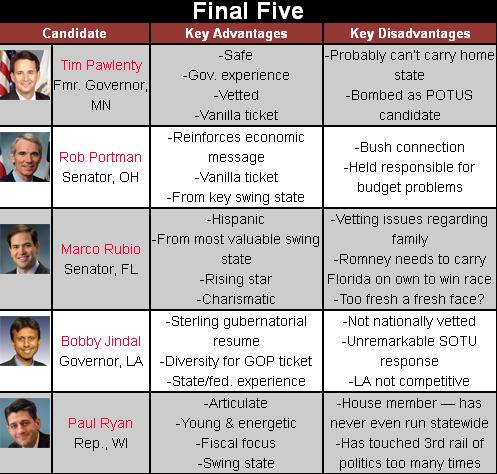Final Veepstakes Ratings: Pawlenty, Portman Continue To Top List
A Commentary By Kyle Kondik and Larry J. Sabato
And then there were five.
After starting out with more than 20 names a few months ago, we can now count our list of Mitt Romney's vice-presidential possibilities on one hand.
Leading the list is the man generating national buzz at the moment: Tim Pawlenty. The former Minnesota governor, who told us jokingly that he was “one chromosome” away from winning a spot on John McCain’s ticket in 2008, would be a credible choice who would offer some regional (Midwest vs. Northeast) and stylistic (blue collar vs. white collar) contrasts with Romney.
Pawlenty’s short-lived presidential campaign flopped last year in part because of a mistimed strategic decision -- deciding to go all-in at last August’s activist-driven Iowa Straw Poll just as Michele Bachmann’s presidential campaign hit its peak. Pawlenty’s poor straw poll showing, and a nearly empty war chest, forced his exit. Given that damaged candidates who were electorally weaker than Pawlenty had moments in the sun during the primary season -- including Newt Gingrich and Rick Santorum -- it’s possible that Pawlenty might have made some progress had he found the money to stay in the race.
Whether or not voters do like or will like Pawlenty, it seems clear that one major constituency group -- the media -- mainly does. The press boosted his candidacy throughout the first half of 2011 despite his middling polling. George Will, the conservative columnist, went so far as to conclude “with reasonable certainty” that one of three men would occupy the White House in 2013: Pawlenty, Mitch Daniels or Barack Obama. (Of course, he still could be right.) While Pawlenty might have some deep dark secrets, he isn’t a blank slate to the national media, which is a mark in his favor.
Granted, a Romney-Pawlenty ticket would be ill-equipped to respond to a foreign crisis during the campaign because of their exclusively state-level political experiences. However, Romney’s other seeming top choices aren’t foreign policy experts either in what is likely to be an economically-driven election.
What would Pawlenty add? Probably not a great deal in the Electoral College, though he could have an impact in his home region. Romney would probably dispatch him primarily to the Midwest, where Iowa, Michigan, Ohio and Wisconsin could all be hotly contested, and where Pawlenty’s regular-guy background might go over better than Romney’s corporate credentials. Pawlenty’s home state of Minnesota probably won’t be in play in any event -- it has the nation’s longest streak of voting Democratic at the presidential level (since 1976) -- although it could flip in the event of an unlikely Romney rout. (Minnesota has spasms of real competitiveness, and one day it is going to surprise the pundits in a presidential election.) If Pawlenty is selected, it will not be because Romney thinks he will win Minnesota (in Pawlenty’s two successful runs for governor, he never received a majority of the popular vote). Rather, it would be because Romney wants a safe running mate who provides some regional and stylistic balance to the ticket. Pawlenty fits the bill, which is why his stock is so high.
Ohio Sen. Rob Portman, who previously led our list, remains our top co-contender, and he would also be a safe pick in an election in which Romney wants to limit his mistakes and keep the national focus on the incumbent. Portman, though, isn’t as nationally well-vetted as Pawlenty and isn’t as good of a stump speaker. On the other hand, the Crystal Ball has long believed Portman can add a point or two to Romney in a state any Republican almost certainly must have to win.
Portman has some company in the “poor speaker” category: Louisiana Gov. Bobby Jindal, whose impeccable resume can’t hide the fact that his 2009 response to the State of the Union isn’t the only clunker speech he’s given. Sen. Marco Rubio (FL), a relatively new entrant on the national stage who is unvetted yet excites the GOP base as no other, and Rep. Paul Ryan (WI), whose popularity with the Republican base is balanced by his controversial budget priorities, are the other remaining names on our list.
Chart 1: Republican vice presidential possibilities
This list is shorter than last time because -- while we understand that a surprise pick is always possible -- we haven’t seen any indication that the following people are being seriously considered:
Sen. Kelly Ayotte (NH): Sarah Palin’s experience may make it difficult for Romney to choose a woman this cycle.
Former Gov. Jeb Bush (FL): Wrong last name. He wasn’t interested, and the sentiment was apparently returned.
Gov. Chris Christie (NJ): One boardwalk confrontation too many.
Former Gov. Mike Huckabee (AR): We’re confident that his Fox TV show pays better than VP.
Gov. Bob McDonnell (VA): Have we ever mentioned transvaginal ultrasounds? Also: He’s too busy saving prestigious universities.
Sen. John Thune (SD): In the boring, competent white guy department, Thune places well but is trumped by Pawlenty and Portman.
P.S. We took former Secretary of State Condoleezza Rice off our list last month, and others should have too -- Drudge, this means you.
At this point, the veepstakes really appears to come down to two names: Pawlenty and Portman. But VP selections are difficult to handicap because there are very few tea leaves to read, especially in Romney’s case because he doesn’t drink tea. One can’t take a poll of what’s going on in Romney’s head as he, and he alone, makes the final choice.
Dominoes down the ballot
Romney is almost assuredly going to pick the person he thinks is the best running mate without regard for down-ticket political calculations. And that’s how it should be -- vice presidential selection is incredibly important, if only because nine of the 44 men who served as president did not complete their term.
But even if Romney’s choice is not affected by them, most selections will have some down-ticket consequences.
Obama’s pick of then-Sen. Joe Biden (DE), and the Obama-Biden ticket’s subsequent victory, emptied Delaware’s senior Senate seat. Gov. Ruth Ann Minner (D) appointed Ted Kaufman, a long-time Biden confidante, to hold the seat in advance of a 2010 special election. Rep. Mike Castle (R) was the odds-on favorite to win the seat, but his surprising primary loss to Tea Partier and 2008 Biden opponent Christine O’Donnell allowed Democrat Chris Coons to win the seat. Without O’Donnell’s primary victory, Biden’s selection would have cost the Democrats a Senate seat.
Of our five finalists, only Pawlenty doesn’t currently hold office, meaning there would be no down-ballot ripple effects from his selection.
If Portman were chosen, Ohio Gov. John Kasich (R) would appoint his replacement. While the Republican bench in Ohio is deep, it looks like Kasich would favor Rep. Pat Tiberi (R), who holds Kasich’s old Columbus-area House seat. Tiberi was a Democratic House target throughout the last decade, though he always won by at least nine percentage points, and his district was made significantly more Republican in redistricting. An appointed Tiberi might have a difficult time in 2014, so long as Democrats found a better candidate than the fellow Portman crushed in his 2010 election, hapless ex-Lt. Gov. Lee Fisher.
Meanwhile, Jindal (elected to a second full term in 2011) would be replaced by Lt. Gov. Jay Dardenne, who would serve out the remainder of Jindal’s four-year term. It would be a big step up in power for Dardenne; currently he’s not even notified when Jindal is out of state, as the Louisiana Constitution says he should be. Finally, Dardenne would always know where the governor is. For Ryan, joining the ticket wouldn’t be as risky as it might seem, because he wouldn’t necessarily have to give up his House seat: He would be able to run for reelection as well as run on Romney’s ticket (similar to the way Biden won reelection to his Senate seat in 2008). If Romney-Ryan won the election, it’s not out of the question that Republican National Committee Chairman Reince Priebus could vie for the potentially competitive seat.
Much like Kasich in Ohio, Gov. Rick Scott (FL) would appoint Rubio’s replacement if he were elected vice president, and the appointee would face voters in 2014. Picking Jeb Bush would probably lock in the seat for the GOP, though Bush could have run for the seat in 2010 but chose not to. Any other Republican nominee could face a stern test from a rejuvenated Charlie Crist, the former Republican governor who unsuccessfully ran as an independent against Rubio in the 2010 Senate contest. Crist might be back on the statewide ballot in 2014 running for senator or (more likely) governor, this time as a Democrat.
One other consideration for Romney if he wins the election: Cabinet selections. Obama may now regret naming Arizona Gov. Janet Napolitano to run the Department of Homeland Security. That’s not because Napolitano has been a bad appointee; rather, it’s because appointing Napolitano elevated Jan Brewer, a vocal Obama critic, to the Arizona governorship.
Again, presidents should pick the best people possible to serve in top administration positions. But those selections can indirectly create headaches for the president’s party, or for the president himself.
Larry J. Sabato is the director of the Center for Politics at the University of Virginia.
See Other Commentary by Larry Sabato
Kyle Kondik is the House Editor at the Center for Politics at the University of Virginia.
See other Political Commentary by Kyle Kondik .
See Other Political Commentary
Views expressed in this column are those of the author, not those of Rasmussen Reports. Comments about this content should be directed to the author.
Rasmussen Reports is a media company specializing in the collection, publication and distribution of public opinion information.
We conduct public opinion polls on a variety of topics to inform our audience on events in the news and other topics of interest. To ensure editorial control and independence, we pay for the polls ourselves and generate revenue through the sale of subscriptions, sponsorships, and advertising. Nightly polling on politics, business and lifestyle topics provides the content to update the Rasmussen Reports web site many times each day. If it's in the news, it's in our polls. Additionally, the data drives a daily update newsletter and various media outlets across the country.
Some information, including the Rasmussen Reports daily Presidential Tracking Poll and commentaries are available for free to the general public. Subscriptions are available for $4.95 a month or 34.95 a year that provide subscribers with exclusive access to more than 20 stories per week on upcoming elections, consumer confidence, and issues that affect us all. For those who are really into the numbers, Platinum Members can review demographic crosstabs and a full history of our data.
To learn more about our methodology, click here.




